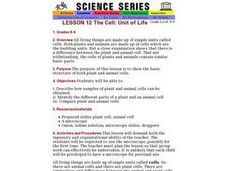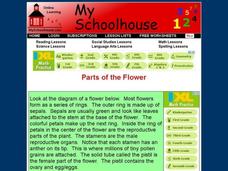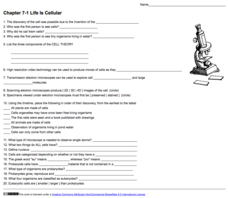Curated OER
Cells - Building Blocks of Life
In this cells worksheet, students review cell organelles and their functions plus the different processes that take place within cells. This worksheet has 9 matching and 5 true or false questions.
Curated OER
Cellular Models
Each student construct a model of a cell on a large cookie, including the parts which were discussed during lecture.? Half of the class will be instructed to make plant cell models and the other half will be in charge of animal cell...
LABScI
Botany: The Plant Dissection Lab
Study everything about plants! The 12-part series of lessons continues with an examination of many aspects of plants. Components of the laboratory activity address the growth and structure of plants by evaluating familiar plants. The...
Curated OER
Plants
Sixth graders examine how plants collect water and breathe. In groups, they participate in a variety of activities in which they discover how plants operate in terrariums. To end the lesson, they discuss why plants are important to the...
Curated OER
Eukaryotic Cell Structure
In this cell structure worksheet, students review the structure and function of eukaryotic cells. Students also compare and contrast an animal cell with a plant cell. This worksheet has 15 fill in the blank, 8 true or false, and 7...
Curated OER
The Cell: Unit of Life
Students identify the parts of plant and animal cells, how samples can be obtained and what the differences are.
Curated OER
Cells are 3-D!
Students design three dimensional models of plant and animal cells. They identify the cells parts, and compare animal and plant cells.
Curated OER
Hands-on Cells
Middle schoolers review the components of a cell and the differences between plant and animal cells by creating a three-dimensional model of each type of cell. In small groups, they use modeling clay and household object to construct...
Curated OER
Characteristics of Plants
For this characteristics of plants worksheet, students name two things that all plants have in common. Then they describe how the cell walls and cuticles help plants adapt to life on land. Students also explain the difference between...
Curated OER
A Cell Is Like A City
Students create analogies that help them remember the cell parts as well as their respective functions.
Curated OER
Parts of the Flower
In this biology worksheet, students examine a diagram of a flower and read a selection that describes all of the parts including the petals, the stamen, the anther, and the sepals. They answer 11 on-line fill in the blank questions using...
Curated OER
Plant Parts
In this plant parts worksheet, students read for information and demonstrate comprehension. In this true and false, fill in the blank, short answer, and multiple choice worksheet, students answer ten questions.
Curated OER
Transportation in Plants
Students investigate how plants transport water and nutrients through the plant. In this transportation in plants lesson plan, students use glass tubing, celery stalks, food coloring and leaves from plants to observe adhesion and...
Curated OER
What Makes a Plant a Plant?
For a plant unit in your biology curriculum, here is a slide show that bestows the basics of plant structure, reproduction, and classification. The information is general. The main point of the lesson is to highlight what characterizes...
Curated OER
Coral Polyp Party
Students complete a project where they label the parts of a coral polyp and discuss the differences between plants and animals. Students use marshmallows, sprinkles, toothpicks, and more to label their coral polyp.
Curated OER
Stomata: Microscopic Openings that Let Plants Breathe
Students participate in a lab experiment to observe and measure the opening and closing of stomata. They focus on photoperiod, locate and identify stomata on a leaf and explain the role of stomata in the daily functioning of a plant.
Biology Corner
Cell Theory Rap
All that this will link you to is a rap about cell theory and organelles. Use it as an example for a creative assignment in your biology class. Divide the class into groups and assign them a topic for which they write and perform a skit,...
Curated OER
Feed Me, Seymour
Students work in small groups to create posters illustrating the major facts and functions of plant organs. Within their groups, they assume the role of specialists creating specialized posters pertaining to the different parts of plants.
Curated OER
The Absorption of Solar Energy
Two sequential parts to this lesson introduce your class to the electromagnetic spectrum, the ability to absorb radiant energy, and the pigments in leaves that are responsible for collecting sunlight to be used in the photosynthetic...
Biology Corner
Life is Cellular
For this cells worksheet, students answer questions about the first person to see a cell as well as the evolution of microscopes. They define the parts of a cell and tell the differences between Prokaryotes and Eukaryotes. There are 20...
Curated OER
Diffusion Through a Membrane
In this diffusion through a membrane worksheet, students fill in the blanks to complete 27 statements about cell membranes, the movement of molecules across the cell membrane, concentration gradients and diffusion.
Curated OER
Sugar and carbohydrates, protein, fat and water - that's what little plants are made of!
Students identify photosynthesis as the mechanism by which plants convert sunlight energy into a usable energy source for plant processes. They identify photosynthesis as the mechanism by which plants create a molecule that can be used...
Curated OER
Reviving Celery
The classic in-class demonstration using celery dipped into water with food coloring is the highlight of this biology lesson plan. Young scientists discover that organisms are made up cells and have distinguishing characteristics. After...
Curated OER
Cells
In this biology worksheet, students use the clues given at the bottom of the sheet to complete the crossword puzzle on cells. There are 22 clues to solve in the puzzle on cells.

























